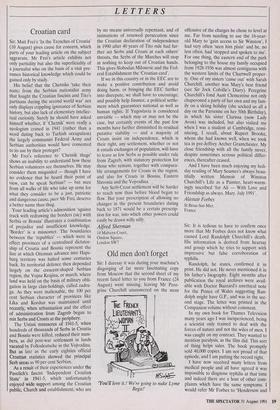LETTERS Croatian card
Sir: Matt Frei's 'In the Trenches of Croatia' (10 August) gives cause for concern, which parts of your leading article on the subject aggravate. Mr Frei's article exhibits not only partiality but also the superficiality of a journalist who on the basis of a visit pre- sumes historical knowledge which could be gained only by study.
His belief that the Chetniks 'take their name from the Serbian nationalist army that fought the Croatian fascists and Tito's partisans during the second world war' not only displays crippling ignorance of Serbian history, but also lack of elementary intellec- tual curiosity. Surely he should have asked himself whether, if `Chetnik' were really a neologism coined in 1941 (rather than a word dating back to Turkish occupation) the largely communist Federal Army and Serbian authorities would have consented to its use by their proteges? Mr Frei's reference to `Chetnik thugs' shows an inability to understand how these Serbian volunteers see themselves. He may consider them misguided — though I have no evidence that he heard their point of view, can he speak Serbian? — but men from all walks of life who take up arms for what they consider to be a just, patriotic and dangerous cause, pace Mr Frei, deserve a better name than thug.
Your leading article's admonition 'against truck with redrawing the borders (sic) with Serbia or Bosnia' illustrates a combination of prejudice and insufficient knowledge. `Border' is a misnomer. The boundaries between the 'republics' — which were in effect provinces of a centralised dictator- ship of Croatia and Bosnia represent the line at which Ottoman advance into Haps- burg territory was halted some centuries back. Its territorial defence then depended largely on the crescent-shaped Serbian region, the Vojna Krajina, or march, where land was held on the basis of military obli- gation in large clan-holdings, called zadru- ga. As they were inalienable, the 100 per cent Serbian character of provinces like Lika and Kordun was maintained until recently, when urbanisation and the effect of administration from Zagreb began to mix Serbs and Croats at the periphery. The Ustasi massacres of 1941-5, when hundreds of thousands of Serbs in Croatia and. Bosnia were killed, reduced their num- bers, as did post-war settlement in lands vacated by Folksdeutsche in the Vojvodina. But as late as the early eighties official Croatian statistics showed the principal Serb areas as 90 per cent Serbian.
As a result of their experiences under the Pavelich's fascist 'Independent Croatian State' in 1941-5, which unfortunately enjoyed wide support among the Croatian public, Church and establishment, who are
by no means universally repentant, and of intimations of renewed persecution since the Croatian declaration of independence in 1990 after 40 years of Tito rule had fur- ther set Serbs and Croats at each others' throats, the Serbs of the Marches will stop at nothing to keep out of Croatian hands. This gives Slobodan Milosevic and the Fed- eral Establishment the 'Croatian card'.
If we in this country or in the EEC are to make a positive contribution and avoid doing harm, or bringing the EEC further into disrepute, we shall have to encourage, and possibly help finance, a political settle- ment which guarantees national as well as human rights. If Yugoslavia is considered unviable — which may or may not be the case, but certainly events of the past few months have further diminished its residual putative viability — and a majority of Croats insist on independence, which is their right, any settlement, whether or not it entails exchanges of population, will have to leave as few Serbs as possible under rule from Zagreb, with statutory protection for those who remain, together with compara- ble arrangements for Croats in the region, and also for Croats in Bosnia, Eastern Slavonia and the Vojvodina.
Any Serb-Croat settlement will be harder to reach now than before blood began to flow. But your prescription of allowing no changes in the present boundaries dating back to 1871 would be a certain prescrip- tion for war, into which other powers could easily be drawn willy nilly.
Alfred Sherman
14 Malvern Court, Onslow Square, London SW7










































 Previous page
Previous page